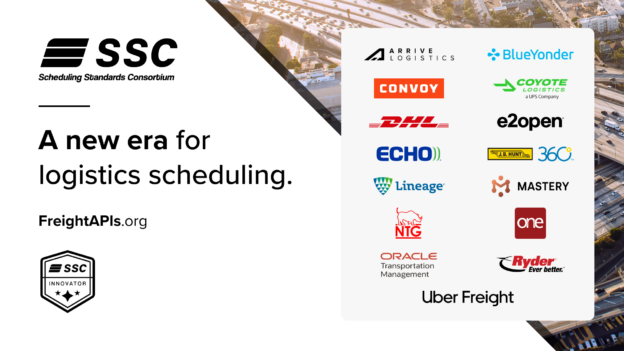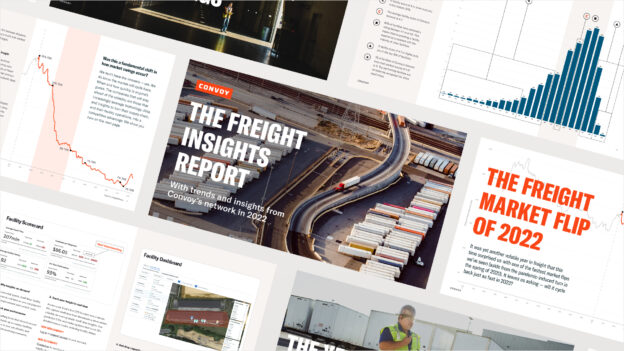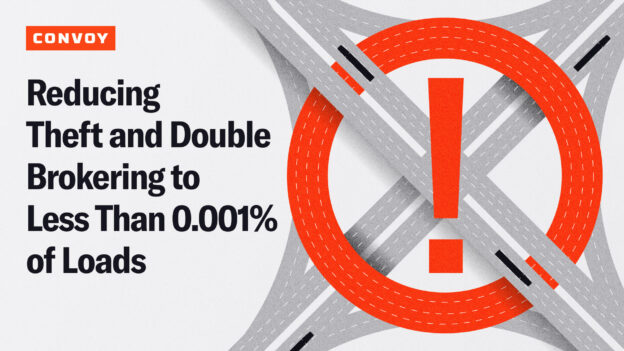5 questions shippers should be asking right now to improve quality and reduce risk.
Industry Insights, Shippers • Published on May 15, 2020
Let’s face it, there are a lot of things outside of our control right now. Despite all the ups and downs in the freight market, there is one thing that shippers should always be sure of – and that is the quality and reliability of your freight partners.
Use these five questions to check-in with your brokers and carriers to make sure you’re on the same page.
1 – Are you registered, licensed and bonded?
This may seem basic, and it is. But if you or your team is frantically trying to find coverage for backup or spot, this fundamental step can be overlooked, and introduce significant risk.
- Ensure your broker or asset carrier has a valid authority. That means the company is registered to operate as a brokerage under federal regulations. All freight brokers are required to register and hold a license with the Department of Transportation (DOT) and the Federal Motor Carrier Safety Administration (FMCSA), which allows shippers to search their database for freight brokers and their respective licenses online.
- Make sure they are bonded. All freight brokers are mandated to hold a freight broker bond in order to operate legally.
2 – What types of insurance do you have, and what do you require of your underlying carriers?
The majority of motor carriers in the U.S. have the following coverage:
- $100,000 Motor Truck Cargo
- $1,000,000 Auto Liability
- Statutory levels of Workers Compensation
However, many shippers require more insurance than this — for good reason.
In some cases, the cargo value is more than $100,000. And, in most cases, financial exposure due to an accident on the road can exceed $1,000,000.
Yet shippers still need access to the nation’s large base of small carriers. This is where a freight partner with a comprehensive and thoughtfully designed suite of insurance policies will be a better partner in managing risk. It’s a critical second layer of protection for shippers.
What should you look for?
Needs vary widely between industries, commodities, and individual companies, but you’ll sleep easier at night by verifying that your freight partner has the following core types of coverage or suitable equivalents:
- Broker Liability. This coverage can vary but is typically inclusive of insurance such as general and logistics liability, products and completed operations, errors and omissions, contingent motor truck liability bodily injury and property damage, and fines and duties, to name a few.
- Excess Liability. Depending on how much coverage you need, a good excess or umbrella policy that sits over a broker liability policy can provide the right amount of insurance.
- Contingent cargo (may be included in Broker Liability). This serves as a backstop to the primary cargo insurance of the underlying motor carrier.
- Additional transportation cargo. Commonly referred to as “Shippers Interest,” but also going by other names, these programs can provide shippers with additional cargo insurance above $100K when necessary. These can be structured on a per shipment or ongoing basis.
- Workers Compensation and Employer Liability
- Crime
- Mandatory broker bond
3 – How is carrier safety assessed?
Accidents are an unfortunate reality in this industry, so you need to take proactive steps to mitigate risk by requiring transportation partners to set safety standards that are acceptable for your business. However, there is no federally mandated national hiring standard, so brokers have their own.
Ask for a list of what their safety standards are. You should be provided with a speedy and thorough reply that amounts to more than “We don’t use unsatisfactory rated carriers.”
Make sure you know:
- If your freight partners work with conditional-rated carriers.
- If they factor CSA safety scores into their carrier assessment criteria.
- How they find out about and respond to carriers in their network who receive “Out of Service” orders.
- Think twice if they don’t have standards, skirt around the subject, or provide a response lacking details. Every shipper determines their own threshold of standards, but answers to these questions will be telling.
4 – How often are carriers screened and audited after onboarding?
It’s not enough to check for compliance requirements at the time of onboarding. Even regularly scheduled static checks (e.g. once a quarter or, gasp, once a year) of carriers is insufficient. Why?
The various statuses of motor carriers will change over time. And, those changes aren’t going to conveniently align with your broker’s scheduled static check of their carrier network.
Ongoing monitoring of the following categories is a foundational and essential part of a good compliance program. Here is a glimpse at how often these categories typically change:
- FMCSA rating – typically monthly, but in some instances safety ratings can be updated more frequently
- CSA Safety Scores (commonly calculated and reported as equivalent BASICS by third party carrier monitoring services) – monthly
- Status of DOT – daily
- Status of MC – daily
- Out of Service designations – daily
- Insurance registered with FMCSA – daily
- Data for newly registered carriers – daily if interstate; monthly if intrastate
- Carrier monitoring Service reports – daily
Knowing that the carriers who are moving freight for you are in compliance within these categories is critical. We recommend working with partners who can audit their carriers automatically and in real time — at least daily if not more frequently.
5 – How do you identify and address fraud?
Those who have been in the industry for a while have experienced their share of “nightmare” loads. Theft. Fraud. Chameleon carriers. Double Brokering. Back solicitation. A load “held hostage.” It’s enough to give you chills.
In this industry, data is a powerful tool that everyone should use to prevent these unfortunate incidents. Ask your partners what they do to prevent fraud.
Transportation providers should have a process to identify fraudulent sign-ups onto their platform. This can be done through:
- Automated methods to identify and stop duplicate profiles.
- Checks to ensure the carrier “is who they say they are” and are authorized to make decisions or sign a contract on the carrier’s behalf.
- Dual factor authentication.
Additionally, there are some excellent carrier reporting services that allow transportation providers and shippers to submit reports of bad behavior. These reports are visible to members of the reporting service and can serve as warnings to other users. If used wisely, these reports can serve as an important layer in the carrier vetting process. Ask your freight partner if they have incorporated the use of these reports into their compliance monitoring process. And again, a process to monitor reports in real time vs. static checks is a far superior approach.
There are thousands of licensed freight brokers and 3PLs operating in the U.S. — with more entering the market every year. Make sure you cover the basics, and ask the advanced questions to ensure you, your goods, and your business is protected.
Sound daunting? Convoy’s industry-leading safety and compliance program will take care of the vetting and monitoring for you.
To provide peace of mind to shippers, Convoy systematically vets carriers against our rigorous compliance standards. Behind every matched shipment, Convoy is automatically and in real-time performing safety, quality, and compliance checks across multiple services including SaferWatch, RMIS, TIA, CargoNet, and CAB.
By relying on systems to automate the process human error is removed from the equation. A motor carrier’s ability to get loads with us is not predicated on how well they know a specific person at Convoy, but how good their service and safety record is.
Convoy outperforms the industry and the majority of the top 25 national asset carriers in average network safety, as measured by estimated crash rates based on FMCSA predictive methodology. With an incident ratio less than 1/20th of the industry average, Convoy is able to materially reduce supply chain costs for shippers.
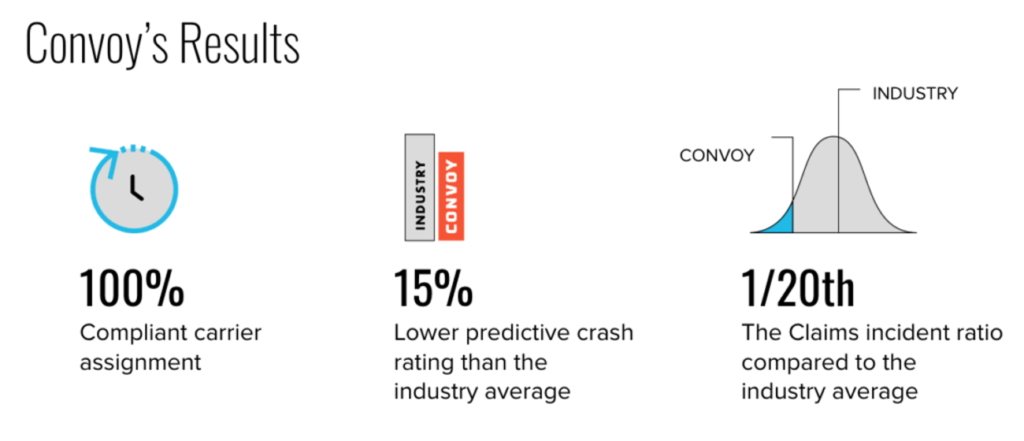
Convoy shipper platform – the easiest way to tap into our safe and reliable carrier network
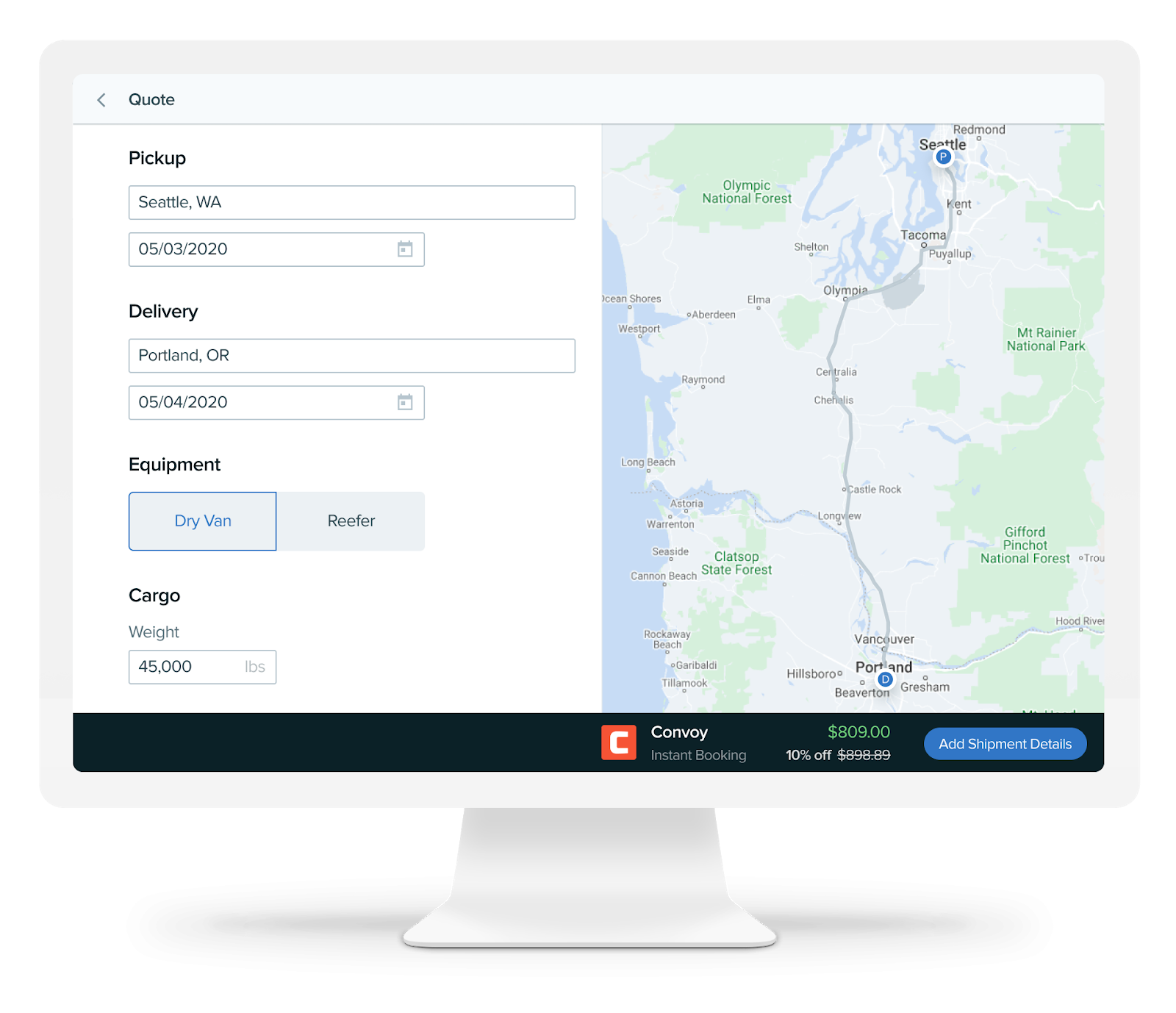
The Convoy shipper platform gives shippers direct self-serve access to quality capacity. With this free, easy-to-use online tool, you can get instant upfront quotes for spot freight, book a load with just a few clicks and GPS track your shipment from start to finish.
Learn more and sign up at https://convoy.com/freight-software.
Interested in learning more about Convoy’s carrier quality & compliance program? Check out these additional resources:
- Blog: Best Practices in Carrier Compliance Management
- Blog: Asset-like Performance and Safety – in a Digital Freight Network
- Webinar: The Hidden Costs of Booking the Cheapest Carrier
Convoy shipper platform is now part of Convoy’s integrated online platform for shippers. For more information, take a look at our freight booking software.
